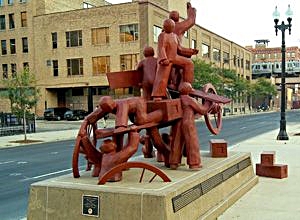Haymarket history is a lie that keeps on giving

By Scott Reeder
SPRINGFIELD – Growing up during the Cold War, May Day always was a bit ominous.
On the evening news, we’d watch tanks, missiles and soldiers march by the reviewing stands in Moscow, Beijing and Havana where stone-faced Communist leaders would look on as their minions toiled.
REMEMBERING: The Haymarket Riot memorial doesn’t tell the entire story.
Even today, May Day is the most important day on the calendar for communist and socialist parties around the globe.
It’s also the day socialists wave red flags from Copenhagen to Cape Town and from Paris to Hanoi.
And May Day has its roots here in the Land of Lincoln.
In Chicago, to be precise, at an event called the Haymarket Riot in May 1886.
As a high school student, I was taught that a group of peaceful workers demonstrating for a shorter workday were attacked by Chicago police. And, after some police officers were killed when a bomb exploded, innocent workers were unfairly tried and hung.
In fact, that is what people around the world have been taught.
It’s a prevarication, bound up in falsehood and wrapped in a lie.
By the standards of the 1880s, it was a fair trial. In fact, it was one of the first trails where scientific forensic evidence was presented.
Yes, I’m aware that history is full of myths. George Washington didn’t chop down a cherry tree. The Liberty Bell didn’t crack on July 4, 1776. And, Benjamin Franklin almost certainly didn’t fly a kite in a thunderstorm.
But the prevailing tale that emerges about the Haymarket Riot here in Illinois bears absolutely no semblance to truth.
Each year, International May Day commemorates the death of the “innocent” Hay Market demonstrators executed by the state of Illinois.
As the Soviet revolutionary Vladimir Lenin once said, “A lie told often enough becomes the truth.”
In fact, 10 years ago, the Illinois Legislature spent $300,000 to erect a sculpture honoring the “victims” of the Haymarket Riot.
Of course the “victims” are no longer just seven police officers killed, they also include the four murderers hung and the one who committed suicide in his jail cell by smoking a stick of dynamite.
A plaque on the monument says the men were “unfairly tried.”
But a funny thing happened on the way to the way to the Politburo.
During a lecture on the Hay Market incident, Timothy Messer-Kruse, a history professor at Bowling Green State University in Ohio, told his students the Hay Market demonstrators received an unfair trial and were convicted despite there being no evidence against them.
“And then a student raised her hand and asked, ‘If there wasn’t any evidence, what was presented during that six-week trial?’ It was an ‘aha moment.’ I didn’t have an answer for her. I was teaching what I had been taught, but it got me wondering and I decided to look at the original trial transcripts,” he said.
And what he found stunned him.
The trial was the longest and most exhaustive held in Illinois up to that point.
In fact, it pioneered the use of forensic evidence. A chemist compared the metallic composition of the shrapnel removed from the police officers’ bodies with the bomb casings and parts found in the home of one of the defendants.
They matched.
In fact, Messer-Kruse asked a Yale University chemistry professor to use modern technology to compare the evidence today.
They still matched.
The evidence against the men was quite substantial. Their appeals were heard by both the Illinois and U.S. supreme courts.
But the political supporters of the defendants billed the men as innocent martyrs.
“The prosecutors in the case didn’t have a reason to speak out after the men were executed. So the history was largely written by those who had a political agenda to support these men,” Messer-Kruse said.
By the way, Messer-Kruse is a liberal himself and a strong supporter of organized labor.
“The part of the problem is the Haymarket has become a part of labor history and its part of the ethos of the labor movement,” he said.
People don’t want to believe different.
But now we know. Will the record be set straight?
Don’t count on it. It’s Illinois after all.
Scott Reeder is a veteran statehouse reporter and the journalist in residence at the Illinois Policy Institute. He can be reached at sreeder@illinoispolicy.org. Readers can subscribe to his free political newsletter by going to ILNEWS.ORG or follow his work on Twitter @scottreeder







